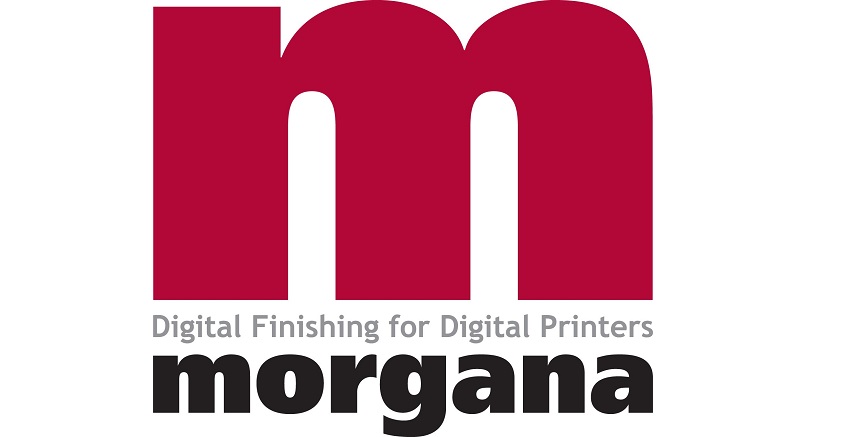26 January 2018

Morgana Systems celebrates 40 years in the industry
At the beginning of 2018 Morgana Systems is forty years old. The company was established and first started trading in January 1978 by Andrew Webster and Paul Garratt. Both had been working for C.P. Bourg in its UK subsidiary, but could see the potential in the UK post-press market and were keen to strike out in their own business. Having secured an exclusive UK distribution for the then ground-breaking Watkiss Rotary collator, the pair knew that the time was right. Other products were swiftly added to expand the offering, including Uchida guillotine products from Japan, and a French built folding product.
The fledging business enjoyed a highly successful start. By 1980 there was a need to expand the business in the UK, and a northern office and showroom was established in Warrington, Cheshire, under the watchful eye of long-term employee John Clason - now sales manager for Scotland.
With a growing understanding of a fast changing market, it wasn't long before the team saw the need to create a new product of their own for a niche they could see in the folding sector. Looking back they might say it was over-designed, and over-engineered, but customers of the 1983 UFO folder were more than impressed - many returning to the company for additional machines. The compact but solid build machine, with cast side frames, was superior to anything at the lower end of the folding market, with the unit slotting in below the hefty price of products from the big players. As testimony to its long life, spares for UFO existing folders are still available from Morgana with many of the original machines still in production across the world today.
A rotary numbering unit, the FSN, was the next home grown product to launch, again this hit the right spot in the bindery sector. The descendants of this unit are still a part of the current machine line-up.
Premises in Fenny Stratford were now outgrown and the business found a new home following the acquisition of Hobson Collators in Ampthill, Bedfordshire.
Assembly of the UFO was transferred to this larger site and could now ramp up, with Andrew and Paul now expanding Morgana's markets into export, with European dealers in France, Germany, Spain and a thriving business growing in Australia.
The costs involved in producing the UFO were high. Morgana's growing understanding of the manufacturing process allowed them to refine the build process, and the 1997 introduction of the Morgana Junior (subsequently growing into the Morgana Major folder and the DocuFold) allowed the business to grow its profits as well as its unit sales with a less expensive build. The Junior made its show debut at Ipex 1998 and proved to be a big hit.
Quen Baum, managing director of Morgana since 2008, takes up the story: "Digital brought in its wake a number of serious finishing issues. Firstly was the tendency of digital output to crack when folded which was compounded by the lack of suitable ways of pre-creasing material prior to folding. Clearly, methods such as hand creasing or using a platen or cylinder press - both needing high levels of operator skill - were totally out of place in the pared down digital environment. There was also the issue of lengthy set-up times, which again were at odds with the idea of digital being quick and easy. What was needed was an effective pre-creasing system that was fast to set up, easy to use and took up the minimum of space. Where short runs were the order of the day, speed of set-up was more important than basic operational speed."
The result of the Morgana thinking on this issue was the AutoCreaser - first shown at Drupa in 2000 and ever since has become a best-selling product throughout the world. The AutoCreaser was the first automated means of creasing digital output prior to folding, and the blade-and-matrix creasing method patented by Morgana for this machine has been used in all its subsequent creasing products.
While creasing was the first area to come under scrutiny, Morgana then turned its attention to folding where it was evident that folders using buckle plates and folding knives could mark delicate digital substrates. This led Morgana to invent and patent its "flying knife" technology in which sheets don't stop during the folding process. This technology was incorporated in another breakthrough product, introduced at Ipex in 2002, called the Morgana DigiFold - the very first combined creaser and folder.
The DigiFold epitomised a new trend in digital finishing technology - multi-functionality - something which was later seen in machines like the Morgana DocuMaster that would feed, crease, fold and stitch in a single pass in order to produce high quality booklets. Flexibility was built into these systems through the ability to by-pass certain functions when full multi-functional capability was not required.
The fast growth of the business was now demanding more production and efficient working space within which to operate. The first ground was broken of its current Milton Keynes headquarters in 2005. The purpose built factory now houses a showroom, manufacturing, spares storage, as well as a full sales and support office.
A look at what is being produced at Morgana's purpose-built factory underlines the huge transformation brought about by the digital print revolution, and the realisation that conventional finishing techniques could never have coped with the issues that digital created.
"The successful digital printer", remarks Quen Baum, "must be able to respond quickly and positively to the needs of the on-demand digital market and flexibility is key in order to be able to change quickly from one job to another without disruption."
AutoCreasers and DigiFolds still account for a large proportion of the machines produced by Morgana and it is a source of pride to Quen Baum and the other 80 plus people who work at Morgana that these products are 100% British designed and manufactured.
All assembly of these units takes place in Milton Keynes using parts sourced mainly from engineering firms within a 25-30 mile radius and electronic components - including printed circuit boards - that are made in-house.
Quen Baum acknowledges that it is a constant struggle to balance customer demand with supplying affordable products at the right price and this means maintaining a day-to-day awareness of market developments so that Morgana can respond quickly to trends and tailor its products accordingly.
A vital part of this operation consists in maintaining close links with all the leading print engine suppliers and much of this work is carried out by Morgana's Business Development Manager, Paul Smout. "We are talking to print engine suppliers all the time", says Paul, "constantly monitoring developments to see what we can come up with that complements the latest techniques in order to streamline the whole printing/finishing process." This co-operation with the companies for whom Morgana are preferred suppliers of finishing equipment means taking part in many joint ventures such as mini-exhibitions etc. "We are delighted to have reached a point where digital print vendors will recommend our products as part of a total package."
Like most suppliers in the industry, Morgana has been finding things tougher in recent years, however with both export and domestic markets to aim at, the company is better placed than many to weather the storm. In addition to working on the development of its own home manufactured products it has also been expanding its portfolio with carefully selected solutions sourced from outside.
Morgana Systems was acquired by Plockmatic International AB of Sweden in February 2013, strengthening its position as an efficient and flexible solutions provider. Through this acquisition, Morgana is now able to offer a much-extended range of booklet making systems. Plockmatic are a leading developer of in-line finishing solutions for the major digital print engine manufacturers. The combined product offering of both companies provides an unrivalled range of finishing options to the digital print sector.
The Plockmatic Group, owners of Plockmatic International and Morgana Systems Limited, were delighted to announce a move of its US Headquarters to larger premises in December 2017. With three times more warehousing and doubling the size of their showroom and training facility. Commenting on the new Rochester facility Ray Hillhouse, VP of Sales and Marketing, said: "We have a much larger base of users and dealers in Europe than in the US. We see the USA as a big opportunity for growth of both our inline and offline product sales. The new larger office and warehouse gives us the ideal base to grow our North American operations.
"Plockmatic Group also acquired KGS srl in April of 2016. KGS manufacture the range of PUR binders Morgana sells-worldwide. Whilst Morgana had been the only customer of KGS, taking 100% of the company's production with the units being sold as the DigiBook range of PUR Binders, ownership of the company has allowed Morgana and Plockmatic's expertise in supply chain and production to help KGS grow, while simultaneously reducing costs.
The Morgana Systems story looks set to continue long into the future of the print and digital print markets.
 Simpler Recycling Requirements in England
Simpler Recycling Requirements in England
21 January 2025
In order to increase recycling rates the government has introduced measures to simplify workplace recycling in England.
 POSITIVE Q4 OUTPUT AND ORDERS GROWTH IN-LINE WITH FORECAST – BUT A NOSEDIVE IN CONFIDENCE HAS DEPRESSED EXPECTATIONS FOR Q1
POSITIVE Q4 OUTPUT AND ORDERS GROWTH IN-LINE WITH FORECAST – BUT A NOSEDIVE IN CONFIDENCE HAS DEPRESSED EXPECTATIONS FOR Q1
6 February 2025
Output and orders in Q4 more-or-less performed as forecast as the UK's printing and printed packaging industry continued its path of steady, but subdued, growth in 2024.











